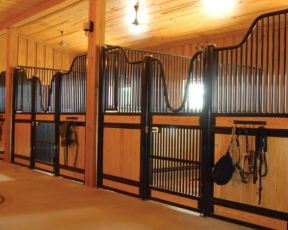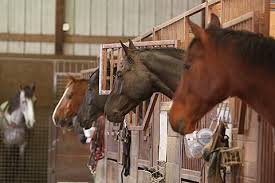 In support of the White House’s proclaimed “Made in America” week, we wanted to celebrate Classic Equine Equipment’s long-time commitment to their own made-in-America products. Their contribution to the long lifespan of products is a quality point you won’t see on the surface. All of the company’s steel products are made in Classic’s hometown of Fredericktown, MO, ensuring complete control over the quality of the process and the end result.
In support of the White House’s proclaimed “Made in America” week, we wanted to celebrate Classic Equine Equipment’s long-time commitment to their own made-in-America products. Their contribution to the long lifespan of products is a quality point you won’t see on the surface. All of the company’s steel products are made in Classic’s hometown of Fredericktown, MO, ensuring complete control over the quality of the process and the end result.
Classic Equine Equipment, located among the rolling hills and horse farms of Southern Missouri, was founded in 1991 on a love for horses and a commitment to their ultimate care and safety. Though a lot has changed since then, our mission remains the same: To provide quality stall systems, barn components and accessories to meet the needs of discriminating horse owners.
The company goes to great lengths to make sure their passion for quality and love for horses shows in the details of the products we produce – smoother edges that prevent scratches or scrapes; narrower spacing between grills to make sure that small hooves don’t get caught; galvanized hand-welded steel frames that can endure all the punishment and abuse your horse can throw at them and keep on shining.
The quality that distinguishes Classic Equine’s products is not always evident to the untrained eye. The rust prevention built into Classic stalls is a case in point. The  company uses only pre-galvanized steel in its grillwork, stall hardware, pasture gates and all other components. A thin coating of zinc is applied to the steel at the mill, which combines with the powder coating process to provide an additional layer of rust prevention. It’s one example of the many extra steps Classic takes to build longevity into great looking, highly functional equipment. This is the case in settings ranging from private, small facilities to large, heavy use public boarding operations and veterinary hospitals.
company uses only pre-galvanized steel in its grillwork, stall hardware, pasture gates and all other components. A thin coating of zinc is applied to the steel at the mill, which combines with the powder coating process to provide an additional layer of rust prevention. It’s one example of the many extra steps Classic takes to build longevity into great looking, highly functional equipment. This is the case in settings ranging from private, small facilities to large, heavy use public boarding operations and veterinary hospitals.
Classic Equine’s stall systems come in styles that suit several budgets, but they’ll never be the cheapest based on price tag alone. When economies over the products’ long life span are factored in, however, the upfront costs are a sound investment. Plus, Classic Equine Equipment promises the one thing nobody can put a price tag on: peace of mind.
For more information, contact Classic Equine Equipment:
sales@classic-equine.com (800) 444-7430
 Whether you’ve been around horses a long time and have lots of ideas from boarding stables or you are brand new to horses, building your own barn can be a challenge. Location, construction materials, stall types and amenities are all decisions to be made. There are literally hundreds of options when building your barn and we won’t be able to cover them all. But we’ll go over the most common types of barns and stalls as well as tips to remember before and during the construction process.
Whether you’ve been around horses a long time and have lots of ideas from boarding stables or you are brand new to horses, building your own barn can be a challenge. Location, construction materials, stall types and amenities are all decisions to be made. There are literally hundreds of options when building your barn and we won’t be able to cover them all. But we’ll go over the most common types of barns and stalls as well as tips to remember before and during the construction process.
 While many horse owners are used to trailering their horse several hours, there may come a time when you’ll need to move your horse a much longer distance. This could be because of a move you will be making to another state and you’ll be taking your horse with you, or you may be purchasing a horse that lives in another part of the country. If you have the time and the truck/trailer to do so, you can certainly trailer your horse yourself, but there are many benefits to using a professional horse hauling company.
While many horse owners are used to trailering their horse several hours, there may come a time when you’ll need to move your horse a much longer distance. This could be because of a move you will be making to another state and you’ll be taking your horse with you, or you may be purchasing a horse that lives in another part of the country. If you have the time and the truck/trailer to do so, you can certainly trailer your horse yourself, but there are many benefits to using a professional horse hauling company.
